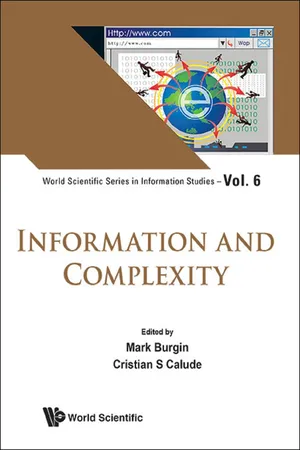
- 412 pages
- English
- ePUB (mobile friendly)
- Available on iOS & Android
Information And Complexity
About this book
-->
The book is a collection of papers of experts in the fields of information and complexity. Information is a basic structure of the world, while complexity is a fundamental property of systems and processes. There are intrinsic relations between information and complexity.
The research in information theory, the theory of complexity and their interrelations is very active. The book will expand knowledge on information, complexity and their relations representing the most recent and advanced studies and achievements in this area.
The goal of the book is to present the topic from different perspectives — mathematical, informational, philosophical, methodological, etc.
--> Editor Mark Burgin, Editor Cristian S Calude 0Information, Complexity, Measure, Computation, Automaton, Information Theory, Science
- The book represents the most recent achievements in information theory, computer science and the theory of complexity
- The book represents advanced ideas and approaches in information theory, computer science and the theory of complexity
- The book is written by the leading experts in information theory, computer science and the theory of complexity
Tools to learn more effectively

Saving Books

Keyword Search

Annotating Text

Listen to it instead
Information
and Complexity
Chapter 1
The “Paradox” of Computability and a Recursive Relative Version of the Busy Beaver Function
Felipe S. Abrahão*
Federal University of Rio de Janeiro, Brazil
Abstract
1.1.Introduction
Table of contents
- Cover
- Halftitle
- Series Editors
- Title
- Copyright
- Contents
- Preface: The Interplay Between Information and Complexity
- Part I. Classical Information and Complexity
- Part II. Quantum Information and Complexity
- Part III. Applications
- Index
Frequently asked questions
- Essential is ideal for learners and professionals who enjoy exploring a wide range of subjects. Access the Essential Library with 800,000+ trusted titles and best-sellers across business, personal growth, and the humanities. Includes unlimited reading time and Standard Read Aloud voice.
- Complete: Perfect for advanced learners and researchers needing full, unrestricted access. Unlock 1.4M+ books across hundreds of subjects, including academic and specialized titles. The Complete Plan also includes advanced features like Premium Read Aloud and Research Assistant.
Please note we cannot support devices running on iOS 13 and Android 7 or earlier. Learn more about using the app